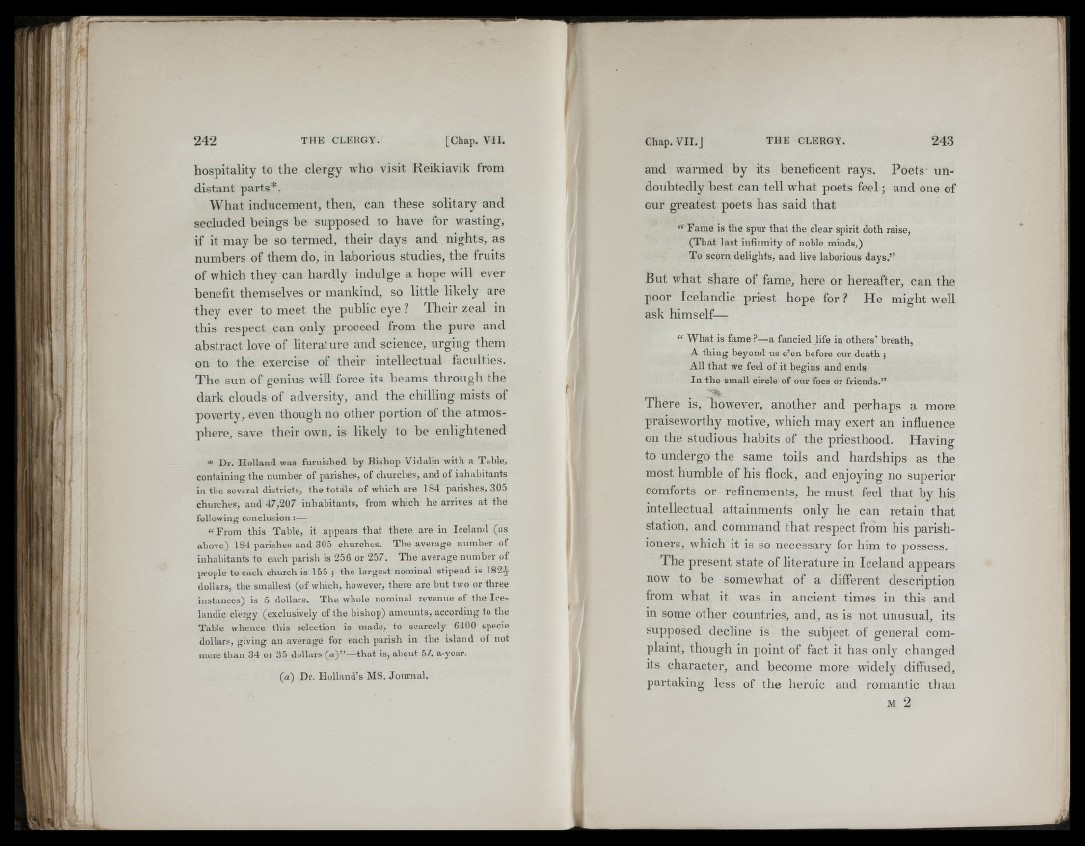
I r
242
hospitality to the clergy who visit Reikiavik from
distant parts*.
What inducement, then, can these solitary and
secluded beings be supposed to have for wasting,
if it may be so termed, their days and nights, as
numbers of them do, in laborious studies, the fruits
of which they can hardly indulge a hope will ever
benefit themselves or mankind, so little likely are
they ever to meet the public eye ? Their zeal in
this respect can only proceed from the pure and
abstract love of literature and science, urging them
on to the exercise of their intellectual faculties.
The sun of genius will force its beams through the
dark clouds of adversity, and the chilling mists of
poverty, even though no other portion of the atmosphere,
save their own, is likely to be enlightened
* Dr. Holland was furnished by Bishop Vidalin with a Table,
containing the number o f parishes, of churches, and of inhabitants
in the several districts, the totals o f which are 184 parishes, 305
churches, and 47,207 inhabitants, from which he arrives at the
following conclusion :—
"From this Table, it appears that there are in Iceland (as
above) 184 parishes and 305 churches. The average number of
inhabitants to each parish is 256 or 257. The average number of
people to each church is 155 ; the largest nomiual stipend is 182^
dollars, the smallest (o f which, however, there are but two or three
instances) is 5 dollars. Th e whole nominal revenue of the Ic e landic
clergy (exclusively of the bishop) amounts, according to the
Table whence this selection is made, to scarcely 6400 specie
dollars, giving an average for each parish in the island ot not
more than 34 or 35 dollars ( a )”—that is, about 5/. a-year.
(rt) Dr. Holland’s MS. Journal.
and warmed by its beneficent rays. Poets undoubtedly
best can tell what poets feel; and one of
our greatest poets has said that
" Fame is the spur that the clear spirit doth raise,
(Tha t last infirmity of noble minds,)
To scorn delights, and live laborious days.”
But what share of fame, here or hereafter, can the
poor Icelandic priest hope for ? He might well
ask himself—
" What is fame ?— a fancied life in others’ breath,
A th in g beyond us e ’en before our death ;
A ll that we feel o f it begins and ends
In the small circle o f onr foes or friends.”
There is, however, another and perhaps a more
praiseworthy motive, which may exert an infiuence
on the studious habits of the priesthood. Having
to undergo the same toils and hardships as the
most humble of his flock, and enjoying no superior
comforts or refinements, he must feel that by his
intellectual attainments only he can retain that
station, and command that respect from his parishioners,
which it is so necessary for him to possess.
The present state of literature in Iceland appears
noAv to be somewhat of a different description
from w'hat it was in ancient times in this and
in some other countries, and, as is not unusual, its
supposed decline is the subject of general complaint,
though in point of fact it has only changed
its character, and become more widely diffused,
partaking less of the heroic and romantic than
M 2